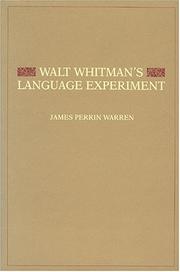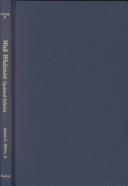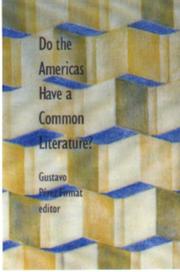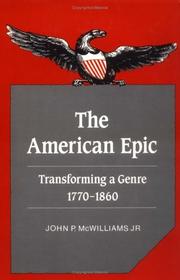| Listing 1 - 6 of 6 |
Sort by
|

ISBN: 0271006889 Year: 1990 Publisher: University Park London Pennsylvania State University Press
Abstract | Keywords | Export | Availability | Bookmark
 Loading...
Loading...Choose an application
- Reference Manager
- EndNote
- RefWorks (Direct export to RefWorks)

ISBN: 0805776001 0805786783 Year: 1990 Publisher: Boston Twayne
Abstract | Keywords | Export | Availability | Bookmark
 Loading...
Loading...Choose an application
- Reference Manager
- EndNote
- RefWorks (Direct export to RefWorks)
Book
ISBN: 0300046839 Year: 1990 Publisher: New Haven London Yale University Press
Abstract | Keywords | Export | Availability | Bookmark
 Loading...
Loading...Choose an application
- Reference Manager
- EndNote
- RefWorks (Direct export to RefWorks)
Influence (Literary, artistic, etc.) --- Influence littéraire, artistique, etc. --- Invloed (Literaire, artistieke, enz.) --- Whitman, Walt --- Knowledge --- Literature --- Influence

ISBN: 0877452679 1587291517 9781587291517 0877452660 9780877452669 9780877452676 Year: 1990 Publisher: Iowa City, IA University of Iowa Press
Abstract | Keywords | Export | Availability | Bookmark
 Loading...
Loading...Choose an application
- Reference Manager
- EndNote
- RefWorks (Direct export to RefWorks)
There has never been an edition of the selected letters of Walt Whitman, a remarkable fact considering how accustomed we are to becoming acquainted with major writers through their letters. Now Edwin Haviland Miller, editor of the six-volume collected writings of Whitman, has used his intimate knowledge of the ""good gray poet's"" correspondence to produce this revealing selection of 250 letters, introduced and annotated concisely and evocatively. Whitman in these letters is simple, direct, colloquial, adding a counterpoint to his artistic voice and persona as a poet.
Whitman, Walt --- Correspondence --- Poets [American ] --- 19th century --- Poets, American --- Whitman, Walt, --- Ouïtman, Ouōlt, --- Uitman, Uolʹt, --- Uitmen, Uot, --- Uitmen, Uolt, --- Viṭman̲, Vālṭ, --- Vālṭ Viṭman̲, --- Witʻŭmŏn, --- Ṿiṭman, Ṿolṭ, --- Vālṭviṭman̲, --- Waltvitmen, --- Whitman, Walter, --- Huiteman, --- Veeitman, --- Уитмен, Уолт, --- ויטמן, וולט, --- װיטמאן, װאלט, --- ويتمن، والت، --- Vitmen, Volt, --- Uitman, Uollt, --- Huiteman, Huate, --- 華特·惠特曼,

ISBN: 0822310546 9780822310549 0822310724 9780822310723 Year: 1990 Publisher: Durham Duke University Press
Abstract | Keywords | Export | Availability | Bookmark
 Loading...
Loading...Choose an application
- Reference Manager
- EndNote
- RefWorks (Direct export to RefWorks)
Comparative literature --- American and Latin American. --- Latin American and American. --- 820 <73> --- Literature, Comparative --- Philology --- 820 <73> Amerikaanse literatuur --- Amerikaanse literatuur --- American and Latin American --- Latin American and American --- History and criticism --- America --- Literatures --- History and criticism. --- Literature [Comparative ] --- Whitman, Walt --- Criticism and interpretation --- Rich, Adrienne --- Poe, Edgar Allan --- Faulkner, William --- Cooper, James Fenimore --- Cather, Willa Sibert

ISBN: 0521373220 0521107024 0511666632 Year: 1990 Publisher: Cambridge Cambridge University Press
Abstract | Keywords | Export | Availability | Bookmark
 Loading...
Loading...Choose an application
- Reference Manager
- EndNote
- RefWorks (Direct export to RefWorks)
John McWilliams's 1990 book was the first thorough account of the many attempts to fashion an epic literature (the anxiously anticipated 'American Epic') from a wide range of potentially heroic New World subjects. At the outset, McWilliams considers the many problems - cultural, political and literary' - of adapting Enlightenment views of republican progress to a genre that had traditionally celebrated the greatness of warriors. After a survey of the many epic poems written during and after the American Revolution, McWilliams shows how and why the epic had to be transformed from imitative narrative poetry into the new, open genres of prose history (Irving, Prescott and Parkman), fictional romance (Cooper and Melville) and free verse (Whitman). Believing that reviews are an important and slighted agent of literary change, McWilliams has written his book in the form of chronological literary history. His book, however, is no march of dates within tired categories. The American Epic suggests that imaginative writers of the Romantic era were in fact far less proscriptive about the boundaries of literary genre than many a twentieth-century writer and scholar.
Poetry --- Fiction --- American literature --- anno 1800-1899 --- anno 1700-1799 --- Epic literature [American ] --- History and criticism --- Revolutionary period, 1775-1783 --- 1783-1850 --- Barlow, Joel --- Criticism and interpretation --- Cooper, James Fenimore --- Dwight, Timothy --- Melville, Herman --- Prescott, William Hickling --- Simms, William Gilmore --- Trumbull, John --- Whitman, Walt --- Irving, Washington --- Parkman, Francis --- Paulding, James Kirke --- Arts and Humanities --- Literature --- Epic literature, American --- American epic literature --- History and criticism. --- United States --- Intellectual life
| Listing 1 - 6 of 6 |
Sort by
|

 Search
Search Feedback
Feedback About UniCat
About UniCat  Help
Help News
News